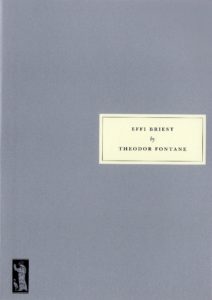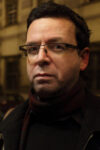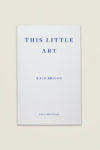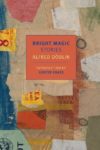I can’t remember if I read Effi Briest in school or not, but I always knew that it was a requirement. Everyone older seemed to be familiar with the book, or the main character, I never differentiated much between the two. Effi darling Briest. Delightful. Cheerful. Lighthearted. Amusing. Sweet like Effi, Briest, like a breeze. A cherished classic. World literature. Theodor Fontane. Breathe Effi, breathe, flowers, summer, wind — breathe Effi, breathe!
I can’t remember if I read Effi Briest in school, but I recall with certainty that Effi’s father, “a well preserved and jovial man in his fifties” was famous for saying: “Louise, it’s too wide of a field” whenever he did not want to discuss anything further, and that German men under similar social pressures — provoked to engage with the emotional lives of their wives or children — used this quote to clarify that they wanted to keep drinking their beers alone, unbothered by further questions.
I can’t remember if I read Effi Briest in school or not, because it probably doesn’t really matter if Effi Briest infiltrated my German life as a whole book or as a number of dictums that seeped deep into our culture constantly shaping the ways we were regarding the world and doing things in it.
One generation follows the next, and long before the newly flowering sets of apple, pear, and plum blossoms were supposed to tip their pollen-receptive stigmas into those German classics which would turn them into those healthy and appetizing fruits that don’t fall too far from the tree, we most certainly embodied deep down in the ovaries of our pistils what there was to know about German female heroines in 19th century literature: Effi’s mother Louise loved Effi, loved watching Effi on the swing going back and forth high up into the air in a garden basking “drowsily in the midday sun.” A green and white tiled path, a large roundel of flowers, a sundial and an ivy-covered churchyard wall with a white-painted iron gate, huge, old, plane trees, shade, a half hid pond, a gangplank and a moored boat.
From an early age our eyes were trained to transmit those signifiers directly to the heart, our intuition knew what they stood for and when on page two of the novel, the aristocratic, beautiful, slender and always so assured Frau von Briest, who at times could be unconventional, told Effi that Effi “ought to have become a circus rider,” Frau von Briest, despite her privileged social status, sounded like every other fictionalized German mother addressing a daughter on a happy summer day.
Always on the swing and up in the air. She looks up from her needlework on an altar cloth and she says: “Effi, you ought to have become a circus rider. Always on the swing and up in the air. I do believe you would enjoy this kind of life.”
And how does Effi reply? What are the very first words we hear Effi say?
“Perhaps, mama, but who is to blame? From whom have I inherited it? From you of course; or do you think from papa?”
Who is to blame? Not the papa of course. What Effi has inherited from her mother, her mother has inherited from her mother, who has inherited it from her mother who got it from her mother. Naturally, she deals with the shame, blame, or guilt of being an oppressed woman in mature and productive ways and an hour later or so, when Baron Instetten, a “man of sound principles, excellent prospects and good manners,” makes his entrance and Louise gently pressures the seventeen year old Effi to say Yes, and marry the thirty-eight year old Prefect von Instetten, the same man who once had courted her and whom she had spurned at the time for his social status, which now twenty years later had improved enough to become a good match for her daughter’s passed on attraction to social status, Effi delightfully obliges.
“That very day Baron Instetten and Effi became engaged.”
Her mother’s former boyfriend? Hertha, Bertha, and Hulda, Effi’s friends, through their simple sounding names viscerally endowed with the trustworthy authority of earthly crumbs that make up a potato field, politely confirm the awkwardness of the situation:
“But ‘Instetten’, and ‘Geert’! Whoever heard of such names? But of course, aristocratic names are often a little odd.”
“Yes, my dear, they are indeed. That is their aristocratic privilege.”
Effi Briest.
The title already gives it away. Effi’s marriage to the twenty year older Instetten won’t turn Effi Briest into Effi Instetten. Does this make Effi tolerable? Does her unhappy marriage make her a heroine? Should dying young as an outcast of the society she was born into be considered an active act of refusal, bad luck, or simply a likely trajectory of a young woman in her time and circumstances? The authoritarian answer is:
“This is as it was meant to be.”
If one hears this sentence often enough, naturally Effi Briest comes across as natural. Yet, her story also feels deeply perverted and wrong, in other words: unnatural, which is, according to Goethe, part of the natural. “The unnatural, that too is natural.”
So what is it?
Is Effi Briest about that which is unavoidable under certain circumstances? Who has agency in Effie’s story? Is there a character endowed with the power, the skills, the courage, or the intelligence to act upon their seemingly honest and most heartfelt desires to be good people leading a happy life together with others? Does the Will, Hannah Arendt asks in The Life of the Mind, exist as a human faculty? Are we capable to act decisively on our desires?
If “everything happens as fate decrees” then it’s a matter of that logic that everything in Effi Briest will be and has been foretold, and that there is nothing that happens in retrospect, which had not been hinted at earlier on. If the course is set on “this is as it was meant to be,” it’s only reasonable that every speculation finds some sort of fulfillment, every word is a signpost, every sentence a line in a grand plan that leads to final inevitability, and that life-changing or life-ending events happen matter of fact-ly. If births, weddings, and deaths simply appear to be the results of the equations that came before, it’s clear why nobody is making a big fuss about it.
“A look of pain, but at the same time something very like a smile, passed over his face and it was over.”
People get born and then they die, some get shot, others die of heartbreak, yet those things don’t make up daily life. What makes up daily life, and therefore life, are the small things, the banalities, the furniture, the clothing, the coffee. And even though this is not what life is really about, Fontane seems to say, you better make the best of it here and there and enjoy what you can when you can, otherwise your life will be completely miserable.
This is the trap Theodor Fontane has laid out for us. Effi Briest is one huge trap, where nothing is really what it is about, where every word is double speak or a metaphor that fits or feeds the self-contradictory life-style of a highly civilized and decadent society, in which the forty year old Major Crampas, Instetten’s friend and former comrade, seduces the bored, isolated, inexperienced and lonely Effi to have an affair with him, when he says:
“There are a lot of things that young women don’t believe,” which in turn gives Effi the opportunity to say that she loves him, which she can only say, of course, because he has just given her permission to say things she doesn’t believe.
Every page has a double floor through which the reader falls and keeps falling, until eventually the falling becomes too fast or straightforward and therefore must be slowed down or interrupted, either through irrational hoping, material distractions or illnesses, the acknowledgement of ghosts, fears, and speculations, interpersonal or political conflicts, or some thinking that proves that the inevitable can actually be prevented, that the “hollowness” of Instetten’s successful career as a civil servant could have been one filled with true meaning and love, that he could have gotten out of the trap of having to kill Crampas in a duel, and that he, as a result of resisting the “inevitable,” could have been a happy man who enjoys the “smooth running of everyday life — having a good night’s sleep and wearing comfortable shoes.” That’s what’s so hard to grasp. Why the pressure to constantly obscure the obvious? Why the confusion about what’s right and wrong? Why not “First things first?” Why not trust one’s instincts?
“He was right she told herself, a thousand times right but yet in the last resort, he was wrong.”
Thirty years ago, when it was a requirement in school, I most likely shook my head after reading the summary on the back of the book and threw it on the pile of uninspiring and useless reading requirements that piled up in my room. I needed books to help me escape from a harsh reality and offer some guidance. So what would an uneventful love affair that ends in the killing and the quasi suicide of the protagonists teach me about humanity, love, love-making, and trustworthy relationships? Why should I care about an aristocratic couple that was addressed by their six household servants, as “your highness” and “master?” Why was that supposed to be world literature?
No real answers or clues presented themselves to that question when I read Effi Briest about a month ago. I had no idea why this book was commonly called a masterpiece. I only knew that the day after I finished it for the first time, I got the shingles. When the doctor asked me if I had recently experienced a tragedy, I took the English translation out of my backpack, and read to her: “I have always been inclined to nervousness . . . but of course I must try to control myself . . . ” She smiled warmly but wasn’t convinced. I shuffled through the pages trying to find a passage that more clearly explained the effects a repressive, irrational, fear mongering political situation had on Effi’s body.
“The world is as it is and its course depends not on us but on others,” I cited, while the doctor pulled off her blue medical gloves and threw them into the trash bin on that gray and cold day that was so very sad and rainy. It even made me feel bad for someone like the First Lady and her son Baron in their golden- tower-apartment on 5th Avenue, a few blocks from where I later, concerned about my tears swelling up in public, stared at a cappuccino that had been brought to me by a charming waiter.
“What excellent coffee!” exclaimed Effi, looking about her and taking in the room and its furnishings. “It’s as good as the coffee we had in Italy. Do you remember, at Bottegone’s in Florence, overlooking the cathedral?”
Yes, I thought, and smiled at the waiter. Exactly. One must be able to have happy days on earth. Once in a while . . .
“ . . . we must take it lightly. Irresponsibility is our greatest asset,” Crampas wrote to Effi. Yes, we must. But is that possible at any given time? Isn’t the beauty of irresponsibility reserved for a certain age? What if I did not understand what Effi Briest was about simply because my timing was wrong? Maybe I should have read the book in school at the required reading age, I thought in the afternoon of that day when I sat on the plastic chair, armpit-shaved among a group of middle aged, industrialized female mammals in starched health care industry issued gowns, about to be mammogrammed in a freezing-cold-cancer-screening mid-town facility. I had filled out and signed the medical, insurance, and liability forms fast and efficiently without reading any of it and now sat shivering in my plastic chair experiencing the ups and downs of small panic attacks, triggered by the fear of dying from breast cancer, also referred to by the most cruel and blunt of my mother’s surviving relatives as the “unavoidable heartbreak from such a life’s disappointments,” and the liberating feelings that came with concepts such as the beauty of irresponsibility, before I finally forced myself to engage in some secondary Effi Briest related reading, which rewarded my emotional instability with the discovery of one, big, reassuring fact:
Thomas Mann said, that if a library had to be shrunk to only six novels, Effi Briest should be one of them.
Ahhhhhhhhh!
Thomas Mann’s approval was good news. I was on the right track, the mammogram was a good idea, with Effi Briest on my bare knees I had placed myself among the very educated. Somewhat relieved I sat there and waited now more calmly for my fate about to be squeezed out of my breasts by those cold and unemotional screening plates that were waiting for me in the next room. And waited, and waited, and waited long enough for the inevitable question to emerge: Who was Thomas Mann?
The fact that he had been awarded the Nobel Prize in 1929, had never urged me to read any of his novels. I had listened to Tonio Kröger as an audio book in a car once, but the bourgeois setting had just felt pretentious at the time. No. As long as I had not read any of his novels, Thomas Mann could not be my guide in understanding Effi Briest. I needed someone I knew I could trust. Rainer Werner Fassbinder. Love is colder than Death (1969), Katzelmacher (1969), Gods of the Plague (1970), Why does Herr R. run Amok? (1970), The American Soldier (1970), Whity (1970), Rio das Mortes (1971), Pioneers in Ingolstadt (1971), Beware of a Holy Whore (1971), The Merchant of four Seasons (1971), The bitter Tears of Petra von Kant (1971), World on a Wire (1973), Ali: Fear eats the Soul (1974), Martha (1974), and then — Effi Briest (1974) in which Fassbiner invested the most work, time, and money of his career in order to adapt Fontane’s novel as a stunning period piece.
What about Effi Briest had resonated with someone like Fassbinder? Instetten had followed the code of honor, killed a man in a duel, and was punished for it with a six week detention from his job. Did this address the fact that in the 70’s former Nazis farted into their new power-inducing German office chairs as if nothing had ever happened? Yes? No? Was Effi Briest a response to the woman’s civil rights movement, which addressed the double standards for men and women in German society? Did he cast his own mother in the role of Louise and narrate the movie himself because this is how he communicated best with his mother? Yes? No? Did Fassbinder foresee that he would tragically die much too young, like Effi Briest?
Fontane Effi Briest or Many People Who Are Aware of Their Own Capabilities and Needs Just Acquiesce to the Prevailing System in Their Thoughts and Deeds, Thereby Confirm and Reinforce It.
That’s the title of Fassbinder’s movie and like the title of the novel, it gives it all away at the beginning. Finally it dawned on me. What had I done? Had I really sat in our one bedroom apartment in NYC with a thirty-year mortgage on the sofa next to a pillow I had embroidered myself and read Effi Briest while my husband was at work and the world fell into pieces all around me? Had I accepted the prevailing system or was I simply adapting this way in order to survive? Had I ignored my own potential and desires and confirmed and strengthened the new system by finally doing my required school homework from thirty years earlier?
“Mom, what’s your favorite Pokemon?”
“Effi Briest.”
“Mom, stop joking, what’s your favorite Pokemon?”
“Effi Briest.”
“Mom — for real — what’s your favorite Pokemon?”
“Effi Briest.”
The seven year old kept asking the same question, and his mother kept providing the same answer, until their joyful interaction had created enough meaningful ambiguity to let the mother conclude the conversation by saying that these are “very wide fields” he may be in a position to oversee once he had gained enough height to get an adult’s perspective.
Oh, it was so blunt. I, as my culture’s product, was in the world to raise another culture’s product in the assembly line of generically productive, global citizens “reinforcing the prevailing system?” What misery. But what about Fassbinder? Wasn’t he an original? A powerful outlier? Did he conform when he adapted Effi Briest?
What Fassbinder gravitated towards in Fontane was, as he once put it, the way the author “rejected everybody and found everything alienating and yet fought all his life for recognition.”
This quote from Max Nelson’s article “Fassbinder Adapts: Effi Briest” shone some light into the tunnel. Maybe for Fassbinder it wasn’t about Effi Briest, but about Theodor Fontane.
Born in 1819 in Neuruppin, thirty miles Northwest of Berlin, Fontane spent his working life as a balladeer, a critic, and a journalist in Germany and London. At the age of sixty he quit his day job and declared himself to be a novelist who would write novels — seventeen in total. Effi Briest was written and published in 1895, three years before his death, when he was seventy-six years old. But how can someone who in Fassbinder’s opinion “rejects everybody” and “finds everything alienating” write novels that made Thomas Mann exclaim:
No writer of the past or the present awakens in me the sympathy and gratitude, the unconditional and instinctive delight, the immediate amusement and warmth and satisfaction that I feel in every verse, in every line of one of his letters, in every snatch of his dialogue.
I had another idea: What if Effi Briest was a very masterful achievement of literary double-speak to disguise the fact that Effi Briest was actually evil, and that those unaware of the trick were as evil as Effi Briest itself?
The hypothesis made me very uncomfortable, not because of the brutality of the disillusion, but because by then I had watched Fassbinder’s movie twice and had enjoyed reading Effi Briest three times in a row, once in German and two times in English, had become occupied with the lives of the characters, had even started to emotionally relate to their inner tortures, hopes, and desires that so tragically were compromised by the constraints, cruelties, and pressures of the outer world. I even had cried about Effi’s pointless and unfair death once.
The question of course is how one defines evil. The impetus for The Life of the Mind, Hannah Arendt writes in the introduction to this amazing book, is to understand how the Holocaust was possible. Had she been right in claiming earlier that it was “The Banality of Evil” that turned a seemingly regular German man like Eichmann into a mass murderer? Was it really possible that the evil of this man was not the presence of dark, destructive, violent human faculties, but simply the absence of thinking for himself?
Might the problem of good and evil, our faculty for telling right from wrong, be connected with our faculty of thought?
Could the activity of thinking as such, the habit of examining whatever happens to come to pass or to attract attention, regardless of results and specific content, could this activity be among the conditions that make men abstain from evil-doing or even actually “condition” them against it?
Evil as an absence. Evil as a deprivation. Evil as not being a full being. Evil as not being able to think for oneself. Evil as not fully being present. Evil as in looking away. Evil as not being aware of what is going on. Evil as not taking responsibility for one’s actions.
Effi Briest is full of such evils, full of funny platitudes and banal, beautiful, little details, enchanting pleasures and pains, there to make the emptiness that comes with the hollow, apathetic life of those, who apologize every human non- or wrong-doing with: “The world is as it is and its course depends not on us but on others,” bearable. What the novel describes in the most lovely ways, is the absence of love. What Fontane talks about in the most thoughtful manner, is the absence of original thoughts that come out of the brains and hearts of his characters.
I had finally boiled it down. The timeless genius of Effi Briest was being an utterly contemporary and generous response to the gutless, clueless, fearful members of an utterly perverted society. Fontane masterfully delivered to those who deserved nothing better than a pointless novel like this. Yet, not only did he forgive his readers, he also, obviously aware of what he was doing, forgave himself for doing it. There is a lot of humor in this and no sarcasm or irony. Effi Briest feeds from the source of humble gratitude, and spreads generous compassion for the lost and the confused, the rich, the poor, the weak, the young, the awkward, the mean, and the cruel, as long as they are occasionally trying to be better than themselves, and at least once in a while reflect on their wrong-doings.
Daniel Mendelsohn calls the phenomena a “dignified defeat” in his New Yorker article: “Heroine Addict — What Theodor Fontane’s women want,” where he also cites Fontane’s short description of “Stechlin,” the last novel he published, a month before he died:
An old man dies and two young people get married, — that is just about all that happens in 500 pages. Of complications and solutions, of conflicts of the heart and conflicts in general, of excitement and surprises there is virtually nothing. . . . Naturally I don’t claim that this is the best way of writing a contemporary novel but it is the one that is called for.
Does producing “what is called for” mean “responding to the times” without judging its individuals? Was Fontane’s way of defeating what Effi Briest was essentially about writing this novel in such a masterful way? Was that why I felt connected to the story, even though I could not really relate to the milieu he described and more than a few times considered his main heroine Effi, lets put it out there, to be a spineless, spoiled, and privileged bore?
Engulfed in such thoughts I was sitting on the sofa, scratching my shingles, when I got an email from a man whom I had talked to earlier in the week about 19th century landscape paintings. He wrote:
I very much enjoyed our conversation and was especially intrigued by your intellectual curiosity. Actually that is a somewhat inaccurate characterization of your curiosity. I think it is something better described as primal.
Primal? My friend Em later on insisted that the word primal was employed by men wanting to fuck out a woman’s brain, and even though her argument did not convince me, from then on the word primal kept occupying my thoughts. And then it clicked again, and I knew this was the final click for now. I was approaching the shore of this undertaking and the moment it came into view, I was suddenly sure on which cliff I would hang my narrative, of why — despite everything — I trusted Theodor Fontane and his characters, and why I was able to believe that Fassbinder had been able to adapt Effi Briest without conforming. My narrative even included a sub-story of how I had gotten to know Fontane without having to google him on the Internet. It was as simple as it was funny and it made me finally laugh out loud: The dog in me had recognized the dog in Effi Briest.
“And this is Rollo. Well, Rollo, old man, how are you?”
Fontane was Rollo, the only creature in the whole novel, able to love another human.
“Rollo?”
“Yes, Rollo. The name will recall to you echoes of the Duke of Normandy, assuming that Niemeyer and Jahnke ever told you about him, and in a way Rollo does not suffer by the comparison. In fact he is merely a Newfoundland dog, a beautiful animal, who loves me devotedly and will love you, too, for he is a connoisseur. As long as he is around, you are safe and nobody, either living or dead, can harm you.”
Rollo was simply present with all his senses, a reliable witness, there to recognize the others without judging them — no part of him was ever absent. He observed, he comforted, he responded, he ran alongside the horses and jumped up to give hugs. He was a loyal dog, who in the end sat on Effi’s grave to mourn her human nature. Fontane was Rollo. And — Rollo — was Fontane.
Briest and his wife were sitting in their accustomed places on the path, facing the roundel with its beds of heliotropes that had been left undisturbed and now framed the stone. Rollo lay beside it, his head on his paws. Frau von Briest who had been pouring coffee, gazed at the roundel and the flower beds. “Look Briest, Rollo is lying beside the stone again. It seems to have affected him more deeply than any of us. He doesn’t take his food any more, either.”
“Yes, Louise. Primitive creatures, that’s what I always say. We humans have less to boast about than we tend to think. We talk disparagingly about instinct, but perhaps it is the best thing we have.”
“Don’t Briest. When you start philosophizing . . . forgive me, but it really is above your head. You have your common sense, but questions like these are really beyond you.”
Franziska Lamprecht is an artist who started writing as an extension of the long-term process based works, she produces together with her husband Hajoe Moderegger under the name eteam. Their projects have been featured at PS1 NY, MUMOK Vienna, Centre Pompidou Paris, Transmediale Berlin, Taiwan International Documentary Festival, New York Video Festival, International Film Festival Rotterdam, the 11th Biennale of Moving Images in Geneva, among many others. In the fall they will do a six months residency at the Hong Kong Baptist University.
This post may contain affiliate links.








